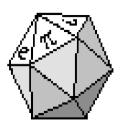Yahoo Answers is shutting down on May 4th, 2021 (Eastern Time) and beginning April 20th, 2021 (Eastern Time) the Yahoo Answers website will be in read-only mode. There will be no changes to other Yahoo properties or services, or your Yahoo account. You can find more information about the Yahoo Answers shutdown and how to download your data on this help page.
Trending News
Can the sum of two positive rational numbers equal the ratio of the sums of numerators to denominators?
Normally this is not true: 7/8 + 2/5 is NOT equal 9/13. The same sum can be written 35/40 + 16/40, which is NOT equal 51/80 (which is also not equal 9/13).
Can it every be true? Examples? Or better, given two positive rationals, is there a procedure to write them in terms of (integral) numerators and denominators so that the sum of the rationals equals the ratio of the sum of the numerators to the sum of the denominators. Could the numbers be equal 7/8 and 2/5?
This is a follow up to :
http://answers.yahoo.com/question/index;_ylt=ApSDy...
where examples with negative rationals (and irrational imaginary examples) were given.
3 Answers
- alwbsokLv 71 decade agoFavorite Answer
I saw your question and the answer that earned best answer when you first posted it. The guy had an excellent answer, especially his necessary and sufficient condition for this property holding for a pair of rationals a / b, and c / d:
ad^2 = -cb^2
ad^2 + cb^2 = 0
Notice that if both the integers on the numerator and denominator are positive (i.e. a, b, c, d > 0), then the left hand side is > 0, that is, we can't have equality in the above equation, and therefore the fractions can't possibly possess the property. If we allow a and/or c to be 0 (b and d are denominators, so they can't be 0), then the only way that we can have equality is if a = c = 0, which means that the fractions are both equal to 0. All that tells us is:
0 / a + 0 / b = (0 + 0) / (a + b)
Now, we can still have rational numbers and have not all a, b, c, and d positive. We do need a and b to have the same sign, as well as c and d. If we make c and d negative, then it is possible to satisfy the equation:
ad^2 + cb^2 = 0
For example:
a = 18
b = 6
c = -2
d = -2
satisfies the equation giving us:
18 / 6 + (-2) / (-2) = (18 - 2) / (6 - 2)
which is true. So, you may prefer to think of it as subtraction working rather than addition.
- ♥Astrid♥Lv 71 decade ago
The equation is...
a/b + c/d = (a + c) / (b + d)
Which reduces to ...
cb² + ad² = 0
Which the answerers to the last question also came up with..
But if you look at this, you can see that it will be impossible to satisfy this equation if a, b , c, and d are positive real numbers. The two terms must balance each other in order to equal zero, but since everything is positive, they are both moving away from zero in the same direction. Sorry, no dice.
- MathsorcererLv 71 decade ago
Presume that a/b + c/d = (a+c)/(b+d), with (a/b) and (c/d) both > 0.
(ad+bc)/bd = (a+c)/(b+d)
(ad+bc)(b+d) = bd(a+c)
abd + ad^2 + b^2c + bcd = abd + bcd
ad^2 + b^2c = 0
ad^2 = -b^2c
-(a/c) = b^2/d^2 = (b/d)^2.
Since (b/d)^2 >= 0, then our presumption is false -->
this is *never* possible if (a/b) and (c/d) are both > 0.
We can start fudging with things such as allowing -a/-c, but such things will be special cases only. Besides, we know that -a/-c is still > 0.




